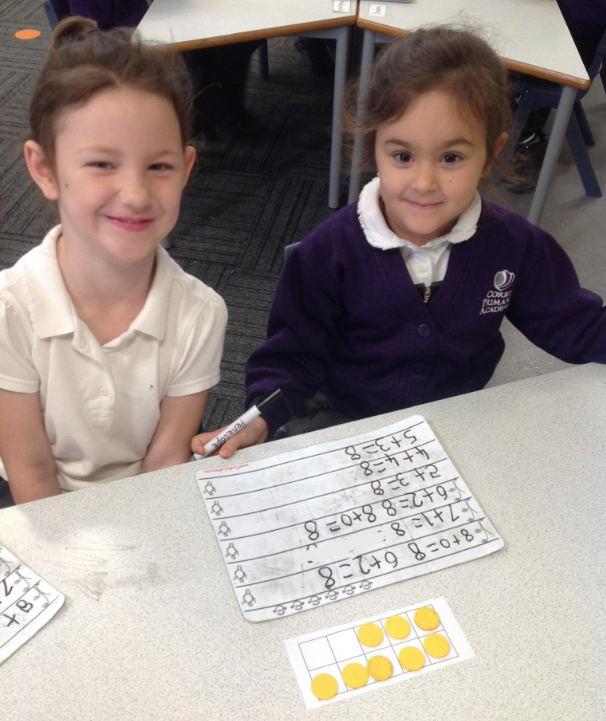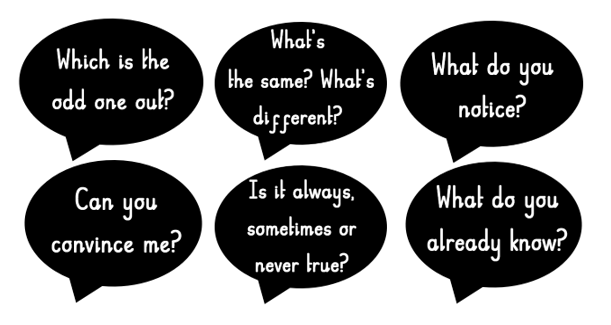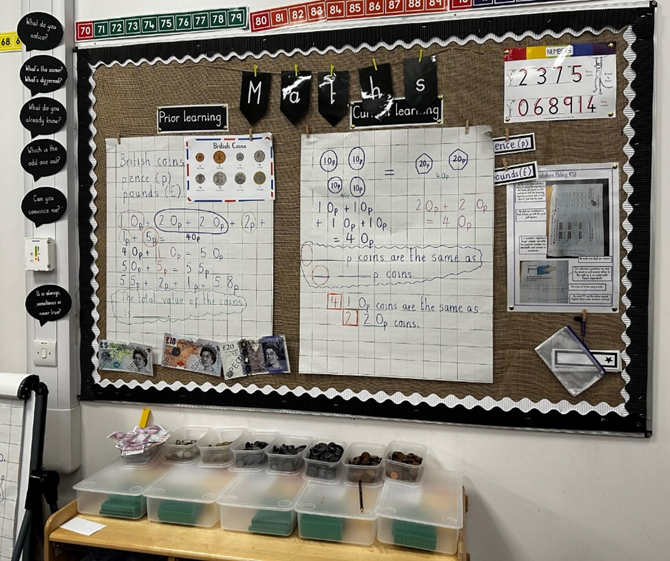Maths
Subject Leader: Sian Mutch



Intent:
At Corby Primary Academy, maths plays an essential role within our curriculum, fostering confident mathematicians who are fluent in the fundamentals of mathematics. From the Early Years through to Upper Key Stage 2, teachers and pupils collaborate to develop a deep understanding of mathematical concepts, using a range of concrete manipulatives and visual representations. Language is carefully woven into each lesson, enabling pupils to articulate their reasoning with clarity and precision. Our teachers design inclusive and memorable learning experiences that inspire pupils to explore patterns, make generalisations, and be bold in forming arguments, justifications, and proof.
Prior learning and key concepts are revisited in every lesson through a ‘Flashback’ activity. This approach enables pupils to regularly retrieve and reinforce prior knowledge, ensuring sustained understanding and application over time.
Our curriculum for maths ensures that all pupils:
- develop conceptual understanding and the ability to recall and apply knowledge rapidly and accurately
- reason mathematically by making connections, following a line of enquiry, conjecturing relationships and developing an argument, justification or proof using mathematical language
- can solve problems by applying their mathematics to a variety of problems with increasing sophistication, including breaking down problems into a series of simpler steps and persevering to seek solutions
Implementation:
At Corby Primary Academy, we embrace the Mastery approach to teaching mathematics. Our long-term planning adopts the White Rose maths scheme of learning approach which embraces the national curriculum aims. The White Rose guidance supports our teachers in planning and delivering lessons that help pupils to become enthusiastic and creative mathematicians.
Teachers draw on a CPA approach to help pupils understand mathematical concepts and make connections between carefully selected representations and models. Within maths lessons, great emphasis is placed on mathematical language and questioning. We use our question stems to prompt discussion and encourage pupils to discuss their thought processes, develop connections and explain their reasoning.

Additionally, fluency is the fundamental of mathematics. In Key Stage 2, teachers provide children with weekly arithmetic practise with increasingly complex problems over time, so that pupils develop conceptual understanding and the ability to recall and apply knowledge rapidly and accurately. Reasoning is a part of every lesson, and the use of Talking Partners enables the children to verbalise and discuss their understanding, therefore developing their understanding and reasoning skills. It is not a stand-alone skill and is intertwined into daily tasks. Problem-solving is injected into all areas of mathematics at CPA and allows children the opportunity to apply their mathematical skills in ‘real life’ contexts to become increasingly sophisticated problem solvers.
To support the development of fundamental mathematical understanding, pupils in EYFS and Key Stage One partake in mastering number four times per week and in Key Stage Two, children partake in the counting stick in order to develop their knowledge of times tables and the connections which can be made between specific times tables. Children have access to TTRockstars, which can be accessed at home, to reinforce their understanding.
Impact:
Assessment for learning supports pupils to develop a secure understanding of mathematical concepts, through retrieval practice, discussion, regular marking and self-assessment. Flashbacks allow pupils to activate prior learning and to make meaningful links with their new learning. Pupils refer to key vocabulary and working walls to support this. The impact of our Mathematics curriculum is constantly monitored through both formative and summative assessment opportunities within lessons.
Leaders monitor the quality and impact of the mathematics curriculum through analysis of books, planning, pupil voice and the extent to which pupils know more and remember more.
Assessment is an integral part of the curriculum and every lesson, to ensure that all children are progressing and are being challenged. In Year 4, children complete the multiplication check and at the end of Key Stage Two, children’s progress and attainment is assessed based upon their SATs scores (Statutory Assessment Tests).
By the time pupils leave Corby Primary Academy, they will be mathematical thinkers who make rich connections across mathematical concepts. They will apply their mathematical knowledge to Science and other subjects and they will have the knowledge required to begin their journey into Key Stage Three.

Please click here to visit the White Rose Education website for parent resources and ways to support at home.

Please click here for White Rose Education Home Learning resources and teaching videos.

Please click here for details about the White Rose '1 minute' maths app.

Please check here for details about the White Rose 'Maths with Michael' video series which explains current methods for parents.


